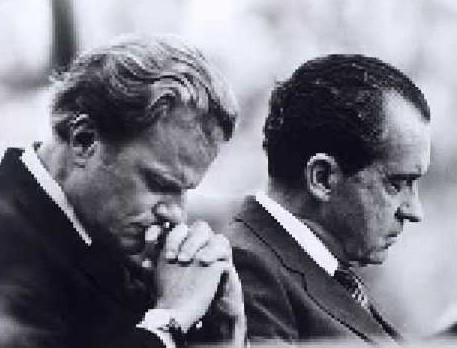At the time of Watergate, the Presidency itself was seen as the problem, that no one person could handle running the most powerful country in the free world, but now I think gerrymandering and the way we apportion national senate seats without regard to population is more the trouble. The system still works, but certainly not optimally, sometimes barely.
Because of a promotional tie-in with a new Tom Hanks documentary about the ’70s, the Atlantic is presenting several of its key articles from that decade, including Arthur Schlesinger’s 1973 piece “The Runaway Presidency.” An excerpt:
The crisis of the presidency has led some critics to advocate a reconstruction of the institution itself. For a long time people have felt that the job was becoming too much for one man to handle. “Men of ordinary physique and discretion,” Woodrow Wilson wrote as long ago as 1908, “cannot be Presidents and live, if the strain be not somehow relieved. We shall be obliged always to be picking our chief magistrate from among wise and prudent athletes,—a small class.”
But what was seen until the late 1950s as too exhausting physically is now seen, after Vietnam and Watergate, as too dizzying psychologically. In 1968 Eugene McCarthy, the first liberal presidential aspirant in the century to run against the presidency, called for the depersonalization and decentralization of the office. The White House, he thought, should be turned into a museum. Instead of trying to lead the nation, the President should become “a kind of channel” for popular desires and aspirations. Watergate has made the point irresistible. “The office has become too complex and its reach too extended,” writes Barbara Tuchman, “to be trusted to the fallible judgment of any one individual.” “A man with poor judgment, an impetuous man, a sick man, a power-mad man,” adds Max Lerner, “each would be dangerous in the post. Even an able, sensitive man needs stronger safeguards around him than exist today.”
The result is a new wave of proposals to transform the presidency into a collegial institution. Mrs. Tuchman suggests a six-man directorate with a rotating chairman, each member to serve for a year, as in Switzerland. Lerner wants to give the President a Council of State, a body that he would be bound by law to consult and that, because half its members would be from Congress and some from the opposite party, would presumably give him independent advice. Both proposals were, in fact, considered and rejected at the Constitutional Convention.Hamilton and Jefferson disagreed on many things, but they agreed that the convention had been right in deciding on a one-man presidency. A plural executive, Hamilton contended, if divided within itself, would lead the country into factionalism and anarchy and, if united, could lead it into tyranny.•

